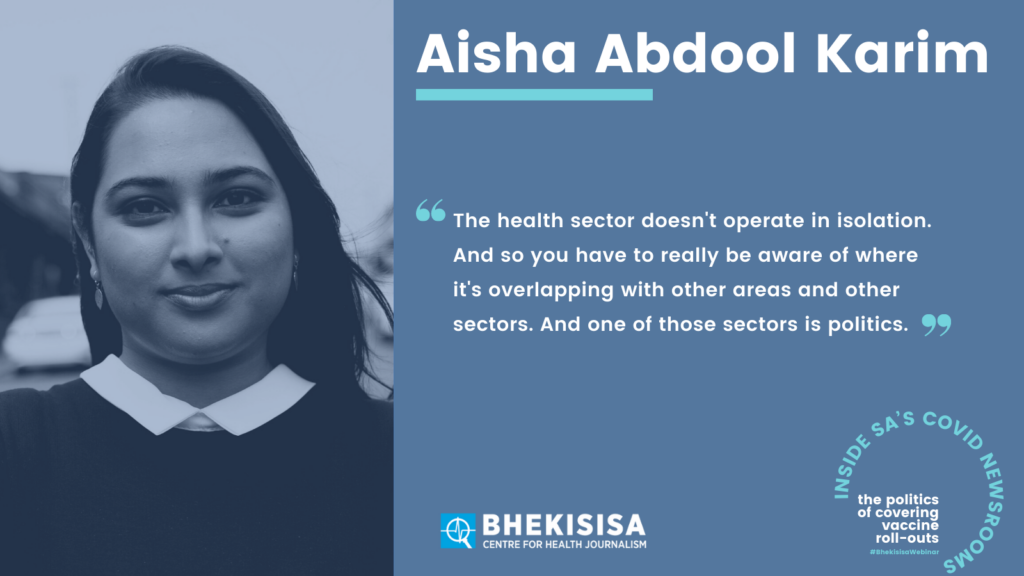- Journalists covering COVID have struggled with accessing information from national and provincial health departments.
- The physical safety and mental health of journalists has remained a major anxiety for editors and newsroom managers throughout the pandemic.
- Balanced COVID coverage needs to tease out the politics from the science and give voice to community experiences.
You see their faces on your screens explaining the latest in pandemic breaking news. You read their names on story bylines picking apart the science and the politics behind the changing policies.
You hear their voices on your radio airwaves explaining what the latest case numbers mean for you and your family.
Now you get an inside look at the realities of South Africa’s journalists bringing you the latest in COVID news.
Our fifth #BhekisisaWebinar, hosted Tuesday 22 June, brought together journalists and editors from across South Africa’s leading media houses. The panel of five, led in conversation by Bhekisisa’s very own Mia Malan, discussed the realities of reporting from the frontlines, how the pandemic has affected the business of news, and how covering COVID has illuminated the politics behind the science.
1. On the frontline and exposed: Heidi Giokos
- Heidi Giokos is an eNCA business correspondent. Her usual coverage of South Africa’s markets took a pivot in February when she began reporting on the Sisonke study. Since then Giokos has been giving viewers live updates from COVID vaccination sites across the country.
- This reporting from the frontlines has resulted in her testing positive for SARS-CoV-2 (the virus that causes COVID) earlier this year.
- Despite taking all the necessary precautions Giokos remains anxious at the thought of possible reinfection. “I’m so scared I get COVID again. And because I’m so exposed and I stay with my parents and they’re elderly, I have to be extra careful.”
- One of the key frustrations in covering COVID has been the obstacles posed by poor government communication, Giokos noted. “You ask Gauteng Health why NASREC [a field hospital] was decommissioned … And you know, we’re in the middle of a third wave, Gauteng numbers are extremely alarming. They tell you ‘no, there are enough beds’. Whereas you speak to the private sector, and you speak to actual doctors on the ground in these wards, and they tell you, ‘there are no beds. People are being turned away’. So it becomes extremely frustrating”.
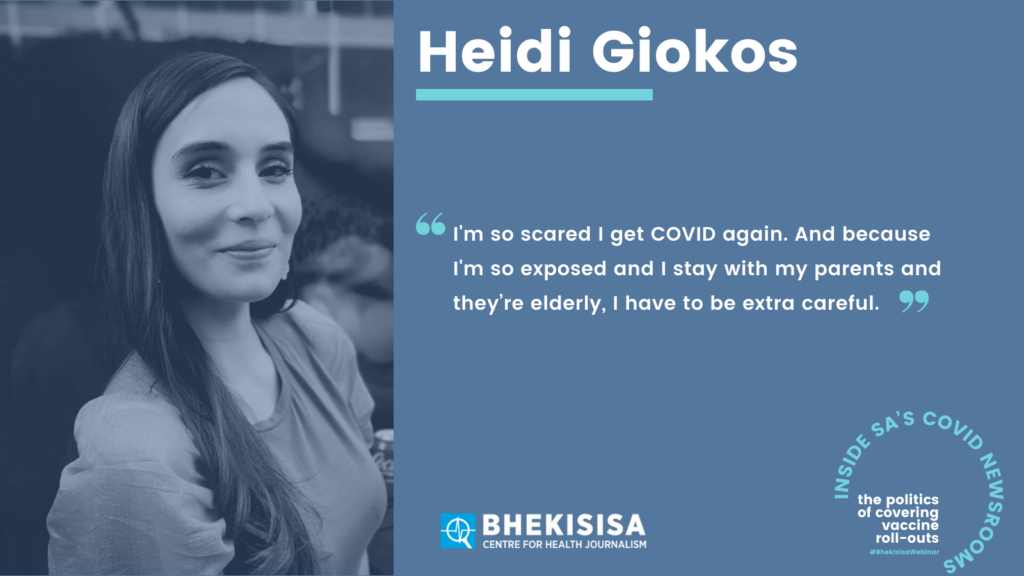
2. Taking care of our journalists: Mahlatse Mahlase
- Mahlatse Mahlase is the group editor-in-chief of Eyewitness News. She leads a team of journalists who need to make sense of the science and politics of the pandemic.
- One of her biggest anxieties has been securing the physical and mental safety of her newsroom’s journalists while they’re on the beat. “That has been one of the biggest challenges for me as a manager: just helping the team manage and navigate the challenges and the impact on their mental health.”
- For Mahlase one of the important roles journalists need to play in covering COVID effectively requires that they strike a balancing act between correcting misinformation and possibly amplifying it. “Because people live on social media and WhatsApp has become THAT communication tool, when the media has the capacity to explain the science, then we should actually find the time”.
- A consequence of poor government communication during the pandemic is that information vacuums can be created, Mahlase highlights. It is the responsibility of regulators such as South Africa’s Health Products Regulatory Authority (Sahpra) to fill information vacuums like these with credible information Mahlase said.
- “I think a lot of us in our different media houses have already asked the question, ‘why is it that Sputnik [a COVID jab made in Russia] and all the others are not yet registered?’ … If they [Sahpra, SA’s health products regulator] dismiss this as a [question in the] political realm that they don’t want to enter, then they’re going to allow for a narrative from a very influential political leader to actually dominate the conversation.”
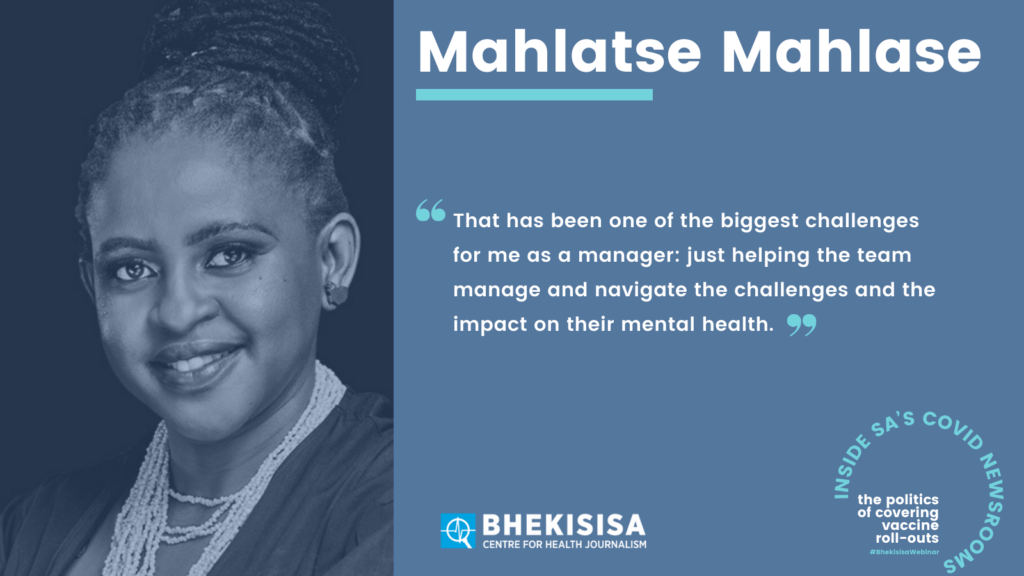
3. Community voices matter: Estelle Ellis
- Estelle Ellis is a senior journalist at the Daily Maverick with experience in reporting health focused stories. Her reporting pays special attention to the community dynamics responding to health policies.
- For the national vaccination strategy to be effective, some autonomy should be granted to sites like those located in the Eastern Cape, Ellis highlighted. “I’ve seen people who came to ask just ‘what’s going on [at vaccination sites]’ and the next thing they know they’ve been registered and vaccinated and sent on their way. And I think it’s important that the vaccination sites are allowed to do those things in our province, that it’s not so super managed. ”
- The quality and reliability of government provided information has also been a concern for Ellis, who’s found contradicting figures between national and provincial data while reporting on COVID. This has meant that developing contacts and relationships with community leaders to get a clear sense of what’s actually happening, is essential for her COVID reporting. “The story must be told by people like the ambulance drivers, the medics, the nurses, the funeral directors. You know, sometimes, especially in the absence of credible information from the health department, we really need those voices.”
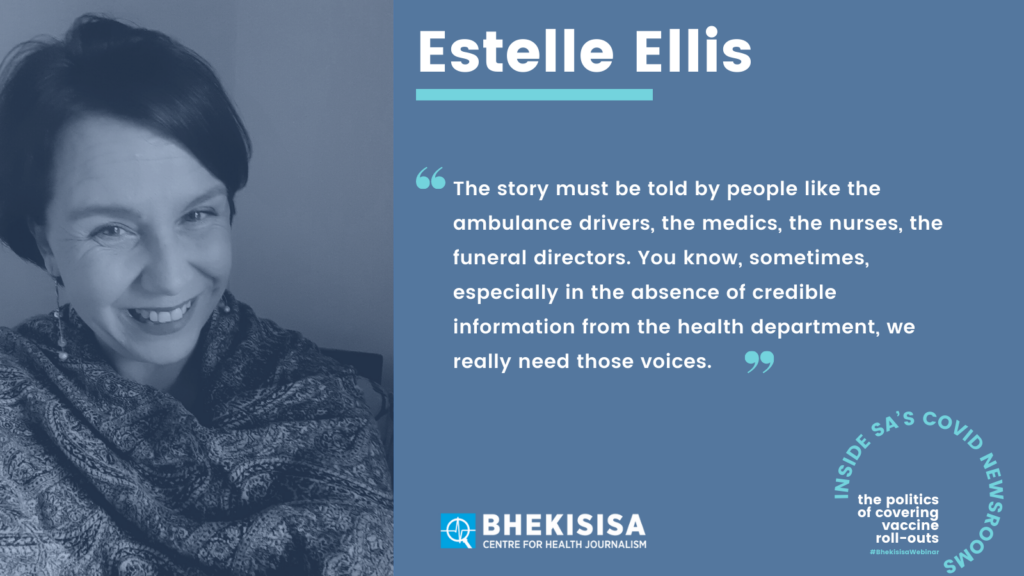
4. Politics and COVID: Zain Semaar
- Zain Semaar is the managing editor for input at Newzroom Afrika.
- COVID exacerbated a number of South Africa’s already present political challenges, Semaar highlighted:
- Access to information: Traditional media houses struggle to access information from government departments. The media is cut out of the loop by departments which “don’t feel obliged to be responsible and to be held accountable”, Semaar explained.
- Corruption: The Digital Vibes saga [a scandal during which a communications company was awarded a R150-million contract, allegedly irregularly, to manage the health department’s COVID and National Health Insurance communication] showed that corruption can occur in any sector at any time.
- Politicising narratives: Exemplified by the politics among scientists, activists and academics who politicise the vaccination roll-out and the reasons behind South Africa’s vaccine choices.
- “Most of these stories have become quite politicised, whether it’s the roll-out of the vaccination, whether it’s the inefficiency of the hospital system to deal effectively with the number of rising infections, or the relationship between business and the health department.”
- For Semaar, some of the important aspects of covering COVID requires reporting on these political dynamics informing the decision making, along with the changing numbers and figures.
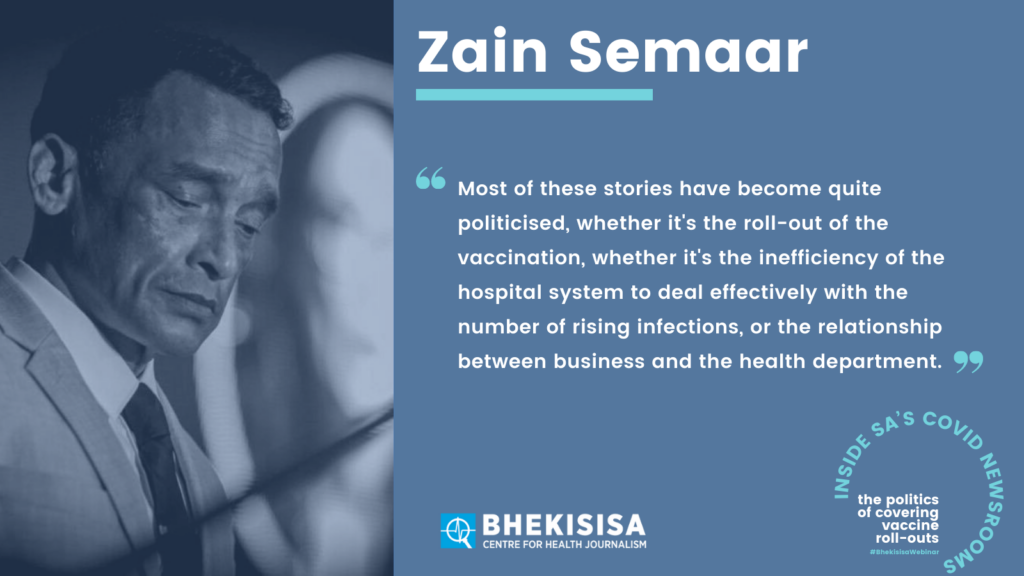
5. Science is political: Aisha Abdool Karim
- Aisha Abdool Karim is now a senior health reporter at Bhekisisa but started her career as an intern at the Daily Maverick where she covered politics.
- For Abdool Karim effective COVID coverage involves clarifying for the public what the roles and responsibilities of the scientific community are in the policy process. For example, advisory committees such as the COVID ministerial advisory committees offer advice and aren’t involved in implementation.
- Picking a focus area of the pandemic to cover has helped Abdool Karim keep a handle on the flood of information she needs to sort through for her reporting.
- Covering the pandemic has helped highlight for her the interconnectedness of health reporting. “The health sector doesn’t operate in isolation. And so you have to really be aware of where it’s overlapping with other areas and other sectors. And one of those sectors is politics.”
